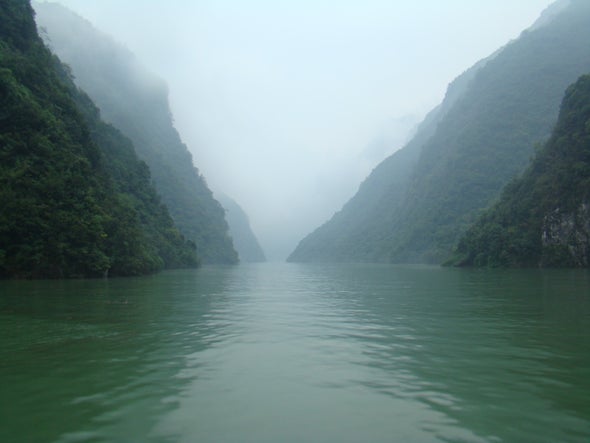好文精选66篇之九——给大自然的馈赠定价
发表时间:2020-07-09 09:37:41
点击蓝色标题,先听音频,记笔记,口头复述,反复听三遍以上。
给大自然的馈赠定价
Nature's Goods and Services Get Priced
- By Julia Rosen on June 30, 2020
 Yangtze River. Credit: Getty Images
Yangtze River. Credit: Getty Images
The gross ecosystem product, or GEP, tries to take into account the contribution of nature to the economy.
Full Transcript
Gross domestic product(国内生产总值): The GDP is a simple way to describe the health of big, complicated economies(可数时表示经济体). And for the last century, the goal of many countries has been to make their GDP go up. But concentrating only on(专注于) GDP has had some downsides(消极面,缺陷).
“In growing the economy, we have, as an unintended consequence(意外后果;非故意结果), destroyed parts of nature, which are also important for our well-being(幸福;安康).”
Stephen Polasky, an environmental economist(环境经济学家) at the University of Minnesota. He and his colleagues (同事)have created a new measurement: the Gross Ecosystem Product, or GEP.
“So that we actually have metrics(度量) that say how are we doing on ecosystems management, managing nature, and not just for nature’s sake, but how is that coming back and influencing our own wellbeing. So really GEP is trying to say, what is the contribution of nature to the economy. So in a parallel way to what GDP does in measuring economic performance.”
Tallying up(tally up ,计算,合计) the economic value of timber(木材。原木) and fisheries is fairly straightforward(非常直接的;简单易懂的). But other benefits of a healthy environment can be less obvious. Insects pollinate(v.授粉) crops. Intact rivers(完整的河流;未经人为破坏的河流) improve water quality and buffer downstream cities from floods. Thriving(繁荣的) ecosystems draw tourists who spend money.
“And part of the issue here is that it is difficult to price some of these things. Some people even say, well, they are priceless. Unfortunately, what it means in practice, priceless means it has zero value in much of the calculations.”
Zero value in the GDP, but not in the GEP. For example, Polasky and his colleagues calculated the figure for Qinghai, a province in western China. They found that the Gross Ecosystem Product exceeded(v.超出;超过) GDP in the year 2000, and equaled three-quarters of GDP in 2015. Over that period, GEP rose by 127 percent, thanks to major restoration efforts (主要的修复工作)and the increasing value of water. The results are in the Proceedings of the National Academy of Science. [Zhiyun Ouyang et al, Using gross ecosystem product (GEP) to value nature in decision making]
The researchers focused on Qinghai because it’s one of several provinces where the Chinese government is experimenting with using GEP as part of its formal decision-making process(决策过程). For instance, GEP can help officials weigh the pros and cons of potential projects(权衡前在项目的利弊), like dams. Or it can be used to show whether local leaders are taking care of the environment, and not just expanding the economy(expand,发展,扩张).
GEP could also serve as the basis for programs that pay residents(居民) to be good stewards (管理员;)of natural resources that benefit themselves and others. In Qinghai, such a program could work for water—the province is where the Yellow, Yangtze, and Mekong Rivers originate(v.起源;开创) , and their waters sustain cities and farms across Asia.
Polasky says their work is just a first step, and he expects GEP to be refined over time. But he says we have to start somewhere.
“If we are actually going to have a sustainable civilization(一个可持续发展的文明), then we have to pay attention to, kind of, the infrastructure(/ˈɪnfrəstrʌktʃə(r)/, 基础设施), basically, the essential things that nature does for us, and not continue to just take them for granted(take sth. for granted 认为某事理所当然).”
—Julia Rosen
(The above tex
上一篇:好文精选66篇之八——情感机器人






